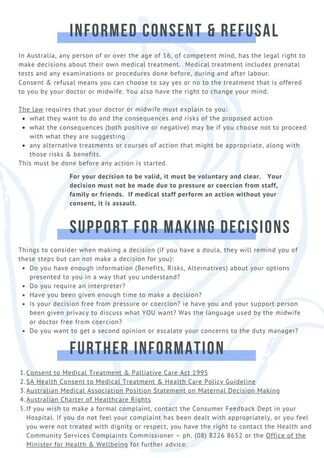And how does a doula advocate for you?When you choose to give birth within the system (through a public or private hospital or one of the homebirth programs), you must be aware that Obstetricians and Midwives will treat you according to the policies of their hospital and state. In South Australia, these are the Perinatal Practice Guidelines, and you can find a link to them at the end of this blog. The government website states that "The statewide guidelines do not address all the elements of clinical practice and assume that clinicians are responsible for discussing care with consumers in an environment that is culturally appropriate to ensure informed decision-making and individualised care for pregnant women, mothers and their babies. The emphasis on specific terms is mine. Because although the health departments mention this in their documents, women rarely receive wholly culturally appropriate, individualised care with a real opportunity for informed decision-making. Let me share some examples. Is it culturally appropriate care to tell a woman she can not have her placenta straight away for burial because part of a policy says that the hospital must stick it in a fridge for seven days, along with every other placenta born there that week? No. Is it individualised care for a midwife to tell a woman that the last person she saw with higher blood pressure was induced straight away, so that is what she will need to do also? No. Has the opportunity for informed decision making been given when a midwife performs a stretch and sweep while doing a cervical exam without asking the woman first? Just because the midwife wanted to "razz things up a bit" No. Is a decision free from coercion when the unit manager storms into a woman's birth space without introduction, demanding to know why the labouring woman isn't consenting to a suggested course of action? No. Is it individualised care for a midwife to tell a woman that she will not attend her birth if she doesn't consent to cervical checks, despite knowing the woman has a history of sexual abuse? No. Has a woman given legally valid consent to have continuous monitoring if the OB only tells her that if she refuses, her baby could suffocate and they won't know about it until it is too late? No. These aren't made-up scenarios. My clients have disappointingly experienced them all and I have witnessed the majority of them. So as your doula, what do I do in these types of situations? How do I advocate for you? It's a question I often get asked. I know that these are all stressful situations which can interrupt the labour process, so my first action is to remind my client that she isn't alone in this - reassuring her with a touch, eye contact or even a smile to help her settle her nervous system as much as possible. Depending on the situation and timing of the event, I might also do any of the following:
If you would like to learn more about what informed consent and refusal looks like, you can download the free handout below. Click on the picture to get your pdf and print it out. Hey, you could even take it with you to your appointments if your health professional needs a little reminder =) Further Reading
Comments are closed.
|
freebiesPrepare for an easier fourth trimester with these 25 Secrets From A Postnatal Doula!
blogs
All
About MeKelly Harper is the owner of Elemental Beginnings Doula & Placenta Services in Adelaide. She provides sleep consultancy, placenta encapsulation and doula services to families during pregnancy, birth and in their fourth trimester. |
|
© 2024 Elemental Beginnings |
|
PREGNANCY, BIRTH & POSTNATAL SUPPORT DELIVERED WITH ❤ THROUGHOUT ADELAIDE & SURROUNDS



